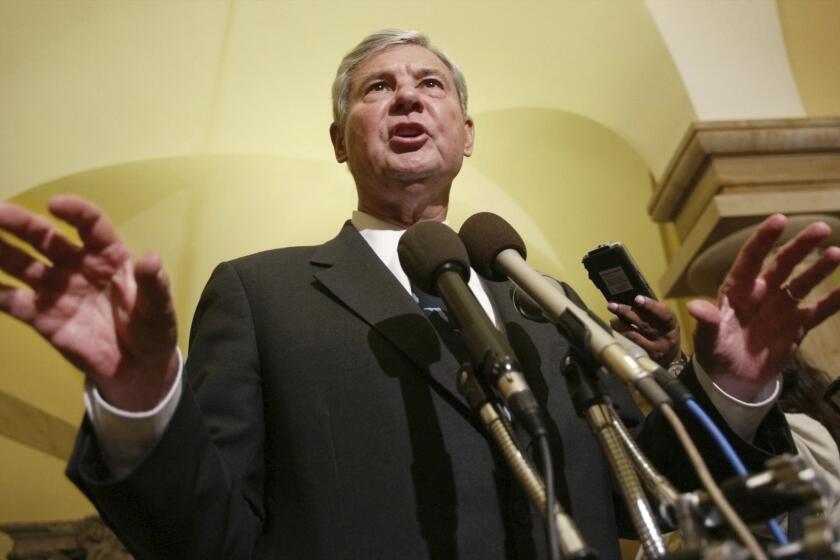Obama’s Afghanistan strategy must be more than more troops
No wonder it’s taking President Obama so long to make up his mind on Afghanistan. The more we examine his options, the less we like any of them. The costs keep going up even as the definition of success is scaled back. Obama already has rejected an immediate withdrawal, for fear of emboldening Taliban insurgents to take power in Kabul and of destabilizing neighboring Pakistan -- concerns we share. But we’re also skeptical that staying put or increasing troop levels will have the desired opposite effect. Indeed, even proponents of a modest-to-substantial military buildup couch their projections in cautious terms.
Eight years and $240 billion into the war in Afghanistan, with more than 900 U.S. military deaths so far, many Americans are asking fundamental questions about goals and strategy. What are U.S. forces still doing there, particularly after Al Qaeda largely has moved its operations to safer terrain in Pakistan? How can the U.S. back the inept government of President Hamid Karzai, whose legitimacy was further undermined by his fraud-tainted reelection? How long will our engagement last, at what price and to what end? Finally, how do we get out? These are the right questions, and Obama owes the country clear answers.
The United States has two overlapping national security interests in South Asia: to reduce the threat posed by Al Qaeda and to stabilize the region so that the government of nuclear-armed Pakistan does not fail and fall into the hands of Islamist extremists. The administration believes that a U.S. withdrawal from Afghanistan would lead to a Taliban takeover and that Afghanistan once again would host Al Qaeda, providing it with better communications, finances and recruitment bases than it has in the Pakistani borderlands. Although the Afghan Taliban is largely a nationalist movement, its Pashtun leaders have a decades-old alliance with the global jihadis in Al Qaeda. Together they threaten to destabilize Pakistan by strengthening their Islamist allies there, as well as posing a more formidable threat to the United States.
After weeks of deliberation and consultations, Obama has said he will soon announce his strategy for how to move forward in Afghanistan. The options before him run the gamut. At one end, it is argued that the United States does not have sufficient troops and treasure -- much less the tenacity -- to defeat the indigenous Taliban, and therefore should dramatically reduce the 70,000 U.S. troops now there, focus narrowly on counter-terrorism operations against Al Qaeda and husband resources for a long-term commitment to economic development in Afghanistan. In this view, the U.S. troops are taking part in a civil conflict and cannot impose a legitimate government on the country; the longer U.S. forces remain, the more they will be seen as occupiers.
At the other end of the spectrum, Army Gen. Stanley A. McChrystal has requested up to 40,000 additional troops for an aggressive counterinsurgency campaign to fulfill Obama’s aim, laid out in March, to “disrupt, defeat and dismantle Al Qaeda in Pakistan and Afghanistan.” He proposes using them to train and expand Afghan security forces, win over the Afghan people and address the corrupt and ineffective governance that fuels the insurgency. Without the deployment of tens of thousands more troops, McChrystal warns, the mission “will likely result in failure.”
Obama appears to be leaning toward a mid-level increase of perhaps 25,000 troops, phased in over time as the Karzai government meets specific benchmarks for developing the Afghan army, improving governance and curbing corruption -- prerequisites for an eventual drawdown of international troops. Karzai must be pressed to expand his circle of power to include his political and ethnic competitors, and to invest in their regions. He also must be supported in efforts to reconcile with combatants, their commanders and tribal leaders whose grievances with the government have sent them to the Taliban for support. These goals are key, because security forces alone can’t hold a country together or compensate for a government that lacks the support of its people. Karzai must be held accountable if the United States is to avoid a quagmire.
Success will take a long time and a strong commitment. And even if the administration does everything right, it may not succeed in staving off a Taliban government or stabilizing the region. But if the administration pursues the war at the expense of political engagement and economic development, then it surely will fail.
More to Read
Get the L.A. Times Politics newsletter
Deeply reported insights into legislation, politics and policy from Sacramento, Washington and beyond. In your inbox three times per week.
You may occasionally receive promotional content from the Los Angeles Times.






